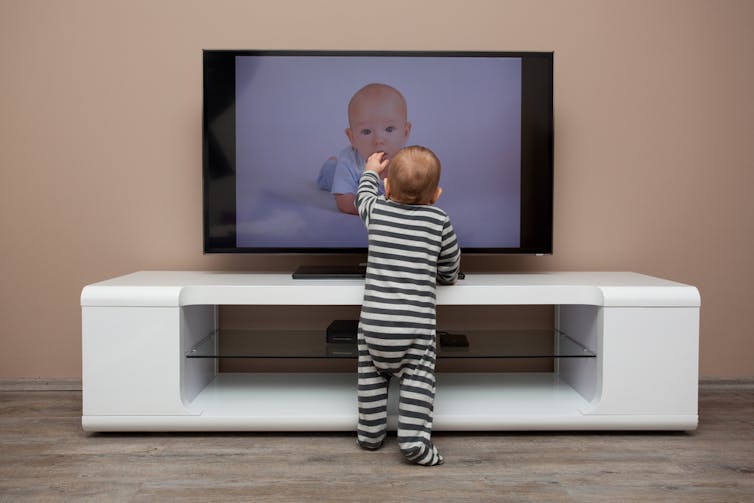Can Children Learn From Tv
Scaremongering virtually the negative effects of children'southward TV-watching is not new. But in our busy lives it'south more than and more tempting to let your child picket television for half an hour or so while you tidy upwardly, launder up, make phone calls, pay your bills or simply take a moment to sit down downwardly.
Despite the prevalence of television programmes targeting young children, the American Academy of Paediatrics discourages television exposure for children under the age of ii years and recommends that exposure is restricted to less than ane-2 hours thereafter. But new research has shown that after watching an educational children's tv programme, toddlers can acquire to count to five and larn to read a simple map presented on the evidence.
Bad reputation
In its 2011 policy argument, the American University of Paediatrics reported that television viewing was associated with an overall reduction in both parent-child interactions and children's creative play, irrespective of whether the television was on in the background or the foreground. Television itself does non offer an platonic learning situation for children. Nosotros know that children up to three years of age showroom a video deficit – meaning they learn less from television than they do from a live interaction. And so it'due south clear that children's television receiver exposure should be moderated.
When presented with Tv set programmes, children are faced with a transfer chore, meaning that they must transfer what they larn from a 2d television screen to the 3D world. The poorer quality of visual and social data presented on TV tin lead to a less detailed representation of the data in children's memory and subsequent difficulties transferring learnt information to the real globe.
Visual data such as size and depth cues are reduced on a 2D television screen compared to the 3D world. Likewise, in contrast to a real world social state of affairs, an histrion or character on television cannot reply to what the child is looking at, saying or doing at a given moment in time. Characterising the video deficit every bit a transfer trouble is helpful for understanding how to support children's learning from television.

Helping children learn from television
There is still promise for educational children'southward Telly programmes. Children'south television producers and parents can employ a number of techniques to enhance learning from TV and support children's knowledge transfer to the existent world. Ane reason that children often inquire to picket the aforementioned Television programmes over and over again is that they learn better from repeatedly being exposed to the same affair.
Repetition within a Boob tube show, such as repeating sequences or new words, or repeatedly watching the same bear witness across a number of days tin heighten children'south learning, memory and transfer of the information to the real world.
What'south more, the more familiar the television character, the more likely it is that children will learn from a television plan featuring that character. Repetition helps children to store more than detailed representations of the data in their retentivity. While watching the aforementioned children's Tv show with your child may be dull for parents, it is beneficial for children.
Interactivity is cardinal
Making children's Television receiver an interactive activeness is also benign for children'due south learning and subsequently noesis transfer to the real world. Television receiver programmes aimed at children aged 2 years and higher up such as Dora the Explorer and Blue's Clues try to promote a social interaction between the child and the television character by getting characters to wait directly at the camera, and using questions and pauses to allow time for children'south responses.
Children are more likely to empathise the content of a children's boob tube programmes when they respond to a grapheme'due south interactive questions. In programmes like Dora the Explorer, telly characters' feedback responses to children are limited to things like "Proficient job" and "That'southward right". Watching television with your kid and giving them ameliorate feedback on their responses volition give you the opportunity to further back up their learning from television.
And then yes, children's Television does have the potential to be educational for young children. Simply not all children'south Television receiver programmes are created equal. While some provide a skillful learning platform for young children, others are better suited to entertainment purposes only. Watching TV with your child and making the feel more interactive can heighten the educational value for your child.
Can Children Learn From Tv,
Source: https://theconversation.com/watching-tv-can-actually-be-good-for-toddlers-38455
Posted by: gibsonyessund.blogspot.com


0 Response to "Can Children Learn From Tv"
Post a Comment